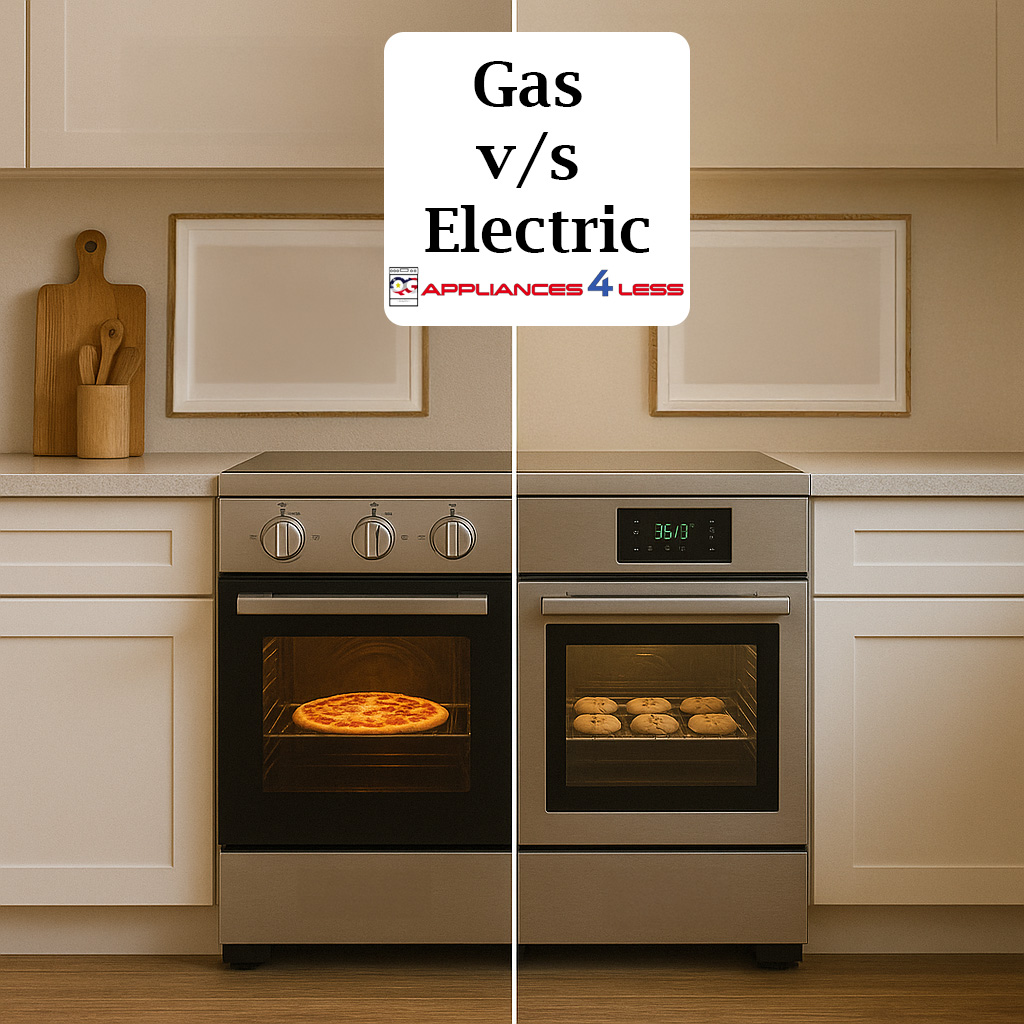Choosing between a gas and electric oven is a crucial decision that affects your cooking experience, energy bills, and kitchen functionality. Both options offer unique advantages, and understanding their differences will help you make the best choice for your home and cooking style.
Gas Ovens: Power and Precision
Gas ovens use natural gas or propane to create heat through burners at the bottom of the oven cavity. This direct flame heating method has made gas ovens a favorite among professional chefs and serious home cooks.

Gas Oven Advantages
Instant Heat Control: Gas ovens respond immediately to temperature adjustments. Turn the dial, and the flame changes instantly, giving you precise control over your cooking environment. This responsiveness is particularly valuable when you need to make quick temperature changes during cooking.
Lower Operating Costs: Natural gas typically costs 30-50% less than electricity for cooking purposes. Over time, this difference can result in significant savings on your monthly utility bills, especially if you cook frequently.
Superior Moisture Retention: Gas combustion produces water vapor, creating a more humid cooking environment. This moisture helps prevent food from drying out, making gas ovens excellent for baking bread, roasting meats, and creating tender, juicy results.
Power Outage Reliability: Most gas ovens can operate during electrical outages, though you may need to light them manually. This reliability ensures you can still cook when the power goes out.
Gas Oven Drawbacks
Installation Requirements: Gas ovens need existing gas lines or professional installation of new ones, which can cost $500-1,500. This requirement may not be feasible in all locations or apartment buildings.
Uneven Heating: Gas ovens can create hot spots and temperature variations, requiring more attention to food placement and occasional rotation for even cooking results.
Electric Ovens: Consistency and Convenience
Electric ovens use heating elements powered by electricity to generate consistent, controlled heat. They’ve gained popularity due to their reliability and user-friendly features.
Electric Oven Benefits
Even Heat Distribution: Electric ovens provide more consistent temperatures throughout the cooking chamber, resulting in predictable baking and roasting outcomes. This even heating reduces the need to rotate dishes during cooking.
Simple Installation: Electric ovens only require a standard electrical connection, making installation straightforward and less expensive than gas alternatives. Most homes already have adequate electrical capacity.
Precise Temperature Control: Digital controls and advanced heating elements offer very accurate temperature settings, often maintaining temperatures within 5-10 degrees of your target.
Advanced Features: Many electric ovens include self-cleaning cycles, convection fans, and programmable cooking modes that enhance convenience and cooking results.
Electric Oven Limitations
Higher Operating Costs: Electricity is generally more expensive than natural gas, leading to higher monthly bills for frequent cooks. The cost difference can be substantial over the oven’s lifetime.
Slower Response Time: Electric ovens take longer to heat up and cool down, which can extend cooking times and make temperature adjustments less responsive during cooking.
Power Dependency: During electrical outages, electric ovens become completely unusable, unlike gas ovens, which may still function with manual lighting.
Key Decision Factors
Cooking Style Preferences
If you enjoy baking bread, roasting meats, or need instant temperature control, gas ovens excel in these areas. The moist heat and immediate responsiveness make them ideal for advanced cooking techniques.
For casual home cooks who prioritize consistency and convenience, electric ovens offer reliable, even results with minimal attention required during cooking.
Energy Costs and Efficiency
Research your local utility rates to determine long-term operating costs. While gas is typically cheaper, regional variations in energy prices can affect this calculation. Consider your cooking frequency and typical oven usage when evaluating potential savings.
Home Infrastructure
Evaluate your current kitchen setup. If you have existing gas lines, switching to gas is relatively straightforward. Homes with only electrical connections may find electric ovens more practical and cost-effective to install.
Environmental Considerations
The environmental impact depends on your local energy sources. In areas with renewable electricity, electric ovens may be more eco-friendly. In regions where electricity comes from fossil fuels, gas ovens might have a lower carbon footprint.
Making Your Choice
Consider these essential questions when deciding:
- Do you need instant heat control for your cooking style?
- Are long-term operating costs a primary concern?
- What infrastructure currently exists in your kitchen?
- How important is consistency, even heating, for your typical recipes?
- Do you need cooking capability during power outages?
Both gas and electric ovens can serve you excellently, depending on your specific needs. Gas ovens excel in responsiveness, operating economy, and creating ideal conditions for artisanal cooking. Electric ovens shine in consistency, convenience, and ease of installation.
Take time to evaluate your cooking habits, budget constraints, and home infrastructure before deciding. Visit Appliance4Less showrooms to experience both types firsthand and consult with professionals who can address your specific situation.
The best oven choice is one that aligns with your lifestyle, cooking preferences, and practical requirements while providing years of reliable performance in your kitchen.